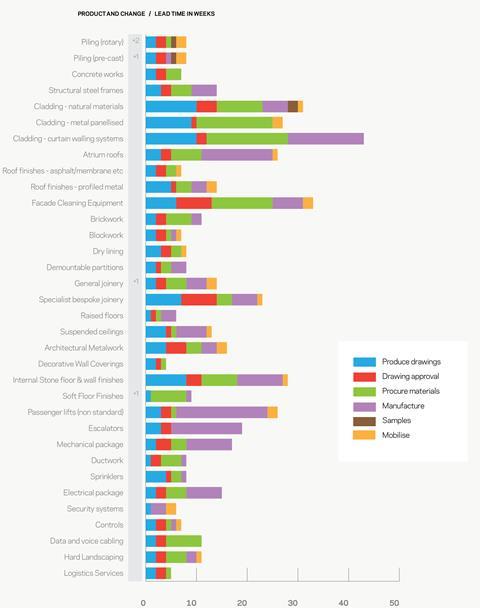Although there are only four trades reporting an increase in lead times this quarter, there are 10 trades that anticipate increases in the next six months
01 / Going up
▲ Rotary piling
▲ Pre-cast piling
▲ General joinery
▲ Soft floor finish
02 / Staying Level
▶ Sprinklers
▶ Brickwork
▶ Concrete works
▶ Structural steel frames
▶ Blockwork
▶ Cladding (natural materials)
▶ Metal panellised cladding
▶ Curtain walling
▶ Atrium roofs
▶ Asphalt/membrane roof finishes
▶ Profiled metal roof finishes
▶ Facade cleaning equipment
▶ Drylining
▶ Demountable partitions
▶ Specialist joinery
▶ Raised floors
▶ Suspended ceilings
▶ Architectural metalwork
▶ Decorative wall covering
▶ Internal stone floor and wall finish
▶ Non-standard passenger lifts
▶ Escalators
▶ Electrical packages
▶ Ductwork
▶ Security systems
▶ Controls
▶ Logistics services
▶ Hard landscaping
▶ Mechanical packages
▶ IT infrastructure equipment
▶ Data and voice cabling
03 / Lead times summary
Rotary piling ▲ lead times have increased by two weeks to eight weeks and contractors are reporting being busier and anticipate lead times will continue to increase. Pre-cast piling ▲ has increased by one week to eight weeks, the second increase in six months.
Concrete works ▶ lead times have remained at seven weeks for a year. Increases are expected over the next six months.
Structural steel frames ▶ lead times remain at 14 weeks. Companies continue to be busy with enquiries. They expect lead times to increase in the next six months.
Cladding – natural material ▶ lead times remain at 31 weeks for the third quarter. Contractors are reporting being busier with both enquiries and workload and expect lead times to increase over the next six months.
Cladding – metal panelised system ▶ lead times remain at 27 weeks. Contractors are busier but do not expect increases in lead times in the next six months.
Cladding – curtain walling system ▶ lead times have remained at 43 weeks since the beginning of 2012. But workload and enquiries have increased and lead times are expected to increase over the next six months.
Atrium roof ▶ lead times remain at 26 weeks.
Roof finishes – asphalt / membrane ▶ lead times have been at seven weeks for a year. Contractors report more enquiries and workload but they do not expect lead times to increase in the next six months.
Roof finish – profiled metal ▶ lead times remain at 14 weeks for the second quarter following the increase last quarter. No further increases have been reported.
Facade cleaning equipment ▶ lead times stay at 33 weeks. Companies are busy but they predict no change.
Brickwork ▶ lead times remain at their extended level of 11 weeks, with no changes in workload or enquiries anticipated over the next six months.
Blockwork ▶ lead times remain at seven weeks, with manufacturers getting on top of availability issues. No changes are forecast over the next six months.
Dry lining ▶ lead times remain stable at eight weeks. Contractors are busier and anticipate an increase in lead times over the next six months.
Demountable partitions ▶ lead times remain at eight weeks, with no changes forecast.
General joinery ▲ lead times have increased by one week to 14 weeks with no change forecast in the next six months.
Specialist joinery ▶ lead time remains at 23 weeks despite being busier than last quarter.
Raised floors ▶ lead times have been static at six weeks since 2007. Workload increased but longer lead times are not expected.
Suspended ceiling ▶ lead times remain at 13 weeks with no increase reported for the next six months.
Architectural metalwork ▶ lead times remain at 16 weeks, with no increase forecast for the next six months.
Decorative wall covering ▶ lead times remain at four weeks with no change anticipated despite reporting increased workload and enquiry levels.
Internal stone floor and wall finish ▶ following the sharp increase last quarter, lead times remain at 28 weeks. Increases are anticipated in the next six months.
Soft floor finish ▲ lead times have increased by one week to nine weeks, the first increase since the end of 2010. Companies are busier and forecast further increases in lead times over the next six months.
Passenger lift non-standard ▶ lead times remain at 26 weeks, workload and enquiries have increased but no change in lead times is forecast for the next six months.
Escalator ▶ lead times remain at 19 with no change forecast for the next six months.
Mechanical packages ▶ lead times remain at 17 weeks for the third quarter. Contractors are anticipating an increase in the next six months as a result of increased enquiries and workload.
Ductwork ▶ lead times remain at eight weeks with no change to the forecast for the next six months.
Sprinklers ▶ lead times stay at eight weeks, contractors report increased enquiry and workload levels but do not forecast an increase in the next six months.
Electrical package ▶ lead times have remained static at 15 weeks for a year. Contractors are busier and enquiries are up but lead times are not anticipated to increase in the next six months.
Security systems ▶ lead times remain at six weeks. There is no increase anticipated in the next six months.
Controls ▶ lead times remain at seven weeks with no change forecast despite increased workload and enquiry.
IT infrastructure equipment ▶ lead times remain at six weeks. No change anticipated in the next six months.
Data and voice cabling ▶ lead times remain at 11 weeks with no changes forecast.
Hard landscaping ▶ lead times remain at 11 weeks despite contractors being busier, no further change is forecast in the next six months.
Data capture and analysis by Mace Business School. For more details on the article and contributors, please visit www.macebusinessschool.co.uk/foresite

























No comments yet